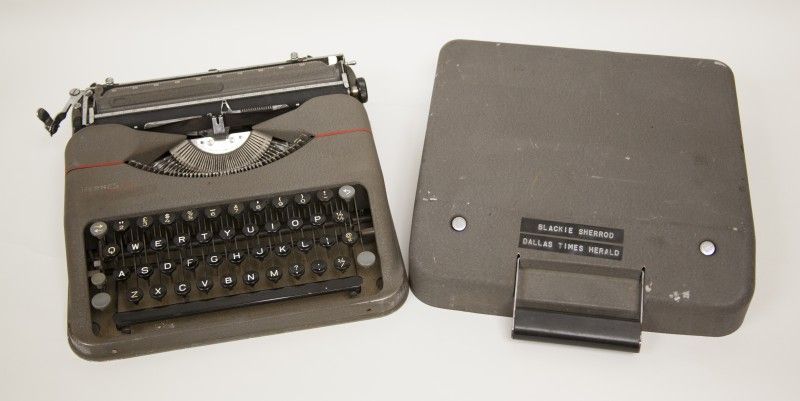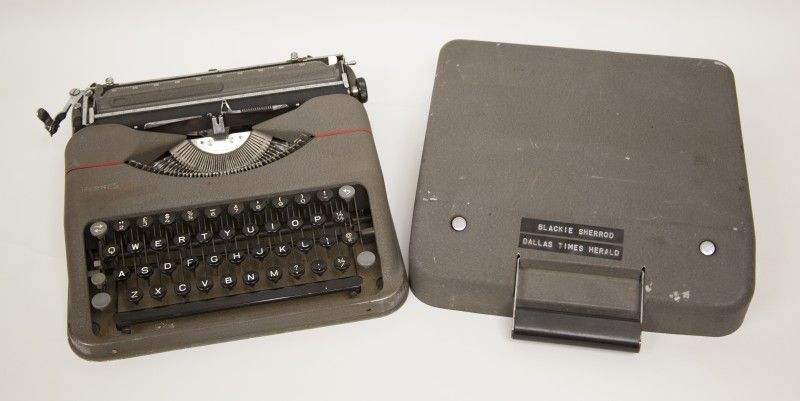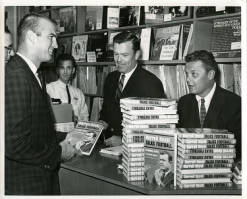SMU Mourns Blackie Sherrod
SMU mourns the passing of legendary sportswriter, University benefactor, and genuine Texas character Blackie Sherrod.

 Blackie Sherrod’s typewriter is part of the memorabilia the legendary sportswriter donated to SMU
Blackie Sherrod’s typewriter is part of the memorabilia the legendary sportswriter donated to SMUTony Pederson, the Belo Distinguished Chair in Journalism at SMU, remembers Sherrod as only a veteran print journalist can:
“Blackie was funny, charming and above all very smart,” Pederson said. “He knew sports, but he also was very well read, which is something young writers can take from Blackie and his colleagues of the time. The generation of sportswriters from Blackie’s era could quote poetry, the classics and modern literature and relate them to the narrative of game stories and commentary. It’s a tradition sadly lost in the instantaneous 140-character analysis that is the standard today.”
Sherrod was an artist on many levels, and donated proceeds from a 2013 auction of his paintings to benefit SMU’s Division of Journalism, resulting in the creation of the Blackie Sherrod Scholarship.
The University is proud to be the repository of Sherrod’s papers and memorabilia, housed in the DeGolyer Library, from his long and storied career. The library’s introductory text that accompanies the collection quotes Bill Millsaps of the Richmond Times-Dispatch as having said, "John Kennedy once said Winston Churchill marshaled the English language and sent it into battle. Blackie invited the English language up on the porch, gave it some four-alarm chili and a Dr Pepper, and sent it out to make the sports world laugh."
The following piece celebrating the donation of his papers to SMU originally ran in the Spring 2004 edition of Annotations, a publication of SMU Central University Libraries:
School of sport: Sherrod shares wisdom

Pederson, a former sportswriter and newspaper editor, is among the generations of writers and readers influenced by Sherrod’s insight and humor as a sportswriter, columnist, and reporter during his 60-year career.
Future generations will continue to enjoy Sherrod’s legacy through his papers recently donated to DeGolyer Library. Items continue to arrive at DeGolyer as Sherrod sifts through correspondence, books, and notes accumulated from his years at four Texas newspapers. The 83-year-old journalist described himself as a “Depression kid that saves everything,” in a recent Dallas Morning News column about his retirement.
Sherrod started his career at the Temple Daily Telegram, then later worked at Fort Worth Press, Dallas Times Herald, and finally the Morning News. He is best known for his sportswriting, but he also excelled as a reporter, playing a pivotal role in the Herald’s coverage of the John F. Kennedy assassination and the 1969 moon landing.
He left a lasting impact on sportswriting, Pederson says. “The concept of sports journalism was changing in the 1960s because of television. The NFL was becoming a major television sport just as sports were becoming part of the national culture. His writing transcended sports and changed what was put into sports columns.”
The collection includes hundreds of reporter’s notebooks containing his notes from events such as the 1989 World Series, the 1994 Kentucky Derby, and the 1988 Tyson-Spinks fight in Atlantic City. Part of Sherrod’s 2,000-book personal library now lines the shelves of DeGolyer and includes sports biographies, NFL record books, NASCAR media guides, and sports encyclopedias, many out of print.
The collection also includes correspondence with readers and sometimes contrary communications with editors. Radio scripts, photographs with fellow sports journalists at a 1964 Dallas Cowboys game, and the compact Hermes typewriter he carried to press boxes through- out the country help round out the collection.
Sherrod is one of the most talented contemporary writers in America, says Russell Martin, director of DeGolyer Library. “The subject matter, sports, is a natural for us,” he says. “The whole country, but especially our part of it, is obsessed with sports. Blackie provides us with an important perspective on this national obsession.”
Sports historians may find a market for their material at SMU Press. In 2005 SMU Press will launch its sports history series, says Keith Gregory, director. Paul Rogers, professor, Dedman School of Law, will edit the series, which will focus on baseball and Texas sports.
Pederson also sees the collection fitting into his plans to establish an endowed chair in sports journalism. “We have a number of students interested in sports journalism,” he says. The subject currently is taught as a broadcast class where students produce a weekly cable television program, “Sports Stampede.”
Influencing young journalists is one of Sherrod’s favorite roles. In a Dallas Morning News profile, Sherrod says he achieved more satisfaction from editing other writers than writing.
Gary Cartwright was one of the young writers he shaped. In a 2003 Texas Monthly column about Sherrod’s retirement Cartwright concluded, “He made us appreciate that sports writing, done correctly, was a noble pursuit.”
This story originally ran in the Spring 2004 edition of Annotations, a publication of SMU Central University Libraries.
.